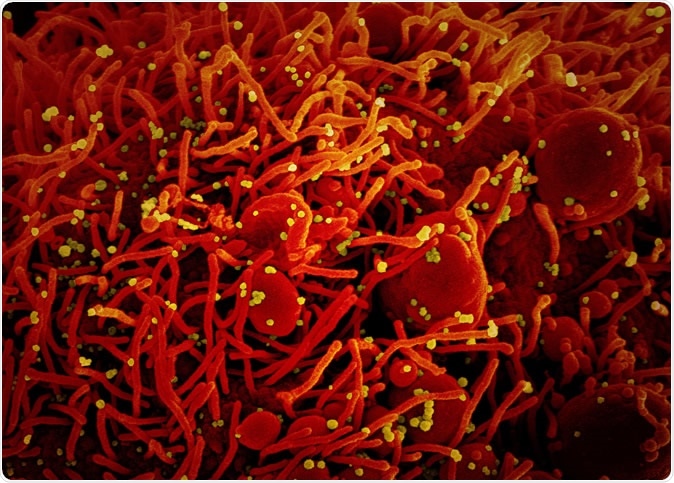Following the reports from different countries of patients recovered from coronavirus disease (COVID-19) but testing positive again during the control diagnostic appraisal, South Korea's Centers for Disease Control and Prevention (CDC) documents a similar occurrence in 51 patients.

Colorized scanning electron micrograph of an apoptotic cell (red) infected with SARS-COV-2 virus particles (yellow), isolated from a patient sample. Image captured at the NIAID Integrated Research Facility (IRF) in Fort Detrick, Maryland. Credit: NIAID
Since the start of the COVID-19 outbreak, the importance of immunity among recovered patients sparked important scientific debate. Some initial strategies in several countries even touted building up population's 'herd immunity' as a salient epidemiological approach.
However, anecdotal reports of patients testing positive for SARS-CoV-2 for a second time (i.e., after they have already had the disease) started to appear – primarily in China, Japan, and South Korea. Questions started to mount: will people even develop a protective immune response against the virus after recovery, and can you contract the infection again?
Negative one day, positive another
In South Korea, a recent report reveals that more than 50 individuals thought to be clear of COVID-19 tested positive once again during the follow-up appraisal. The director-general of South Korea's CDC, Dr. Jeong Eun-Kyeon, reveals the possibility of viral "reactivation" in individuals thought to free of COVID-19.
"There have been many cases when a patient during treatment will test negative one day and positive another," explains Dr. Jeong. "While we are putting more weight on reactivation as the possible cause, we are conducting a comprehensive study on this," he adds.
There have been other examples of patients developing a disease – or even dying – from COVID-19 after purportedly being cured. In China, it was described that people left the hospital, only to return with the disease later again. This also happened with two doctors treating infected patients in Wuhan, China, and similar cases were reported in Japan.
Tackling the dilemma: reinfection or reactivation?
The issue of SARS-CoV-2 detection in recovered individuals could represent a diagnostic issue, where a false-positive test result may appear due to viral residues from the initial infection; however, it could also suggest that individuals may not develop immunity to the illness.
Many health experts believe positive re-tests likely represent errors in testing, rather than true reinfection. The other compounding issue is when patients are released from hospitals too early, making them positive during control testing.
Presidential Coronavirus Task Force Advisor and the Director of National Institute of Allergy and Infectious Diseases Dr. Anthony Fauci recently discussed developments in this global pandemic with JAMA Editor Howard Bauchner, and also addressed this issue.
In the live-streamed discussion, Dr. Fauci explained that it is highly unlikely that people can get infected with the coronavirus more than once – at least within such a short time frame characteristic for all the described cases.
"If a person gets infected with coronavirus A, and then gets reinfected with a coronavirus, it may be coronavirus B", explained Dr. Fauci. "But right now, we don't think that this is mutating to the point of being very different."
Implications for vaccine development
South Korea recognized that the vital pool of patients is those that contract the virus, but exhibit atypical or hardly any symptoms. They have been in the vanguard of tracing these cases, and such practice resulted in the controlled epidemic situation in this country.
Accordingly, the South Korean CDC will conduct a detailed epidemiological analysis of the cases that became positive again, Dr. Jeong said. Resolving this issue carries significant implications for further epidemiological measures and vaccine developments.
Dr. Jeong Eun-Kyeon explains that patients are considered cured if the test was negative two times within 24 hours. He further explained that in this patient group, all the tests were conducted in a relatively short time frame after the affected individuals were cleared. Therefore, it is unlikely that they got re-infected.
This issue was also highlighted by the authors of a recent German study published on the medRxiv preprint server. "Vaccine approaches targeting mainly the induction of antibody responses should aim to induce particularly strong antibody responses in order to be effective," they conclude.
Hence, resolving this issue swiftly in the clinical arena is essential and may further inform the current race to the vaccine, as some candidates have already entered phase I clinical trials.
Important Notice
medRxiv publishes preliminary scientific reports that are not peer-reviewed and, therefore, not be regarded as conclusive, guide clinical practice/health-related behavior, or treated as established information.
Sources:
Journal reference:
- Woelfel, R., Corman, M., Guggemos, W., Seilmaier, M., Zange, S., Mueller, M., Niemeyer, D., Vollmar, P., Rothe, C., Hoelscher, M., Bleicker, T., Bruenink, S., Schneider, J., Ehmann, R., Zwirgmaier, K., Drosten, C., Wendtner, C. (2020). Clinical presentation and virological assessment of hospitalized cases of coronavirus disease 2019 in a travel-associated transmission cluster. Medrxiv. https://www.medrxiv.org/content/10.1101/2020.03.05.20030502v1